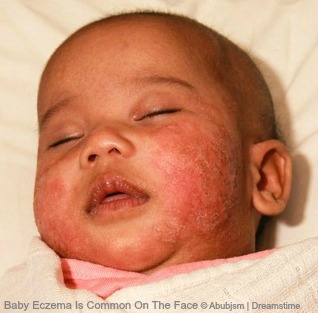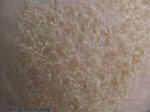Take Control Of Your Facial Eczema. Don't Let It Control You
Facial eczema can be difficult to live with. It can be stressful.
It can be more noticeable, making the sufferer self conscious. Stress can then make the symptoms worse, becoming more inflamed and itchy.
There are ways you can manage and treat it, to improve its condition, and feel better about it.

The main types of eczema that affect the face are
Symptoms
The symptoms of facial eczema are the same as most types of eczema
It can appear anywhere on your face. The most common areas affected are
- Eyelids. This is a very sensitive area, so can be very prone to eczema. Care has to be taken with management and treatment
- Around The Mouth. Can be affected by what you eat and drink. It is common in children with atopic dermatitis
- Ears. Can be extremely itchy. Scratching should be avoided to limit an infection occurring
- Forehead. Can occur anywhere on the forehead, especially along the hairline. Seborrhoeic dermatitis can occur there, as it is common on the scalp
Some areas on your face are more sensitive than others. And some areas are more likely to come into contact with allergens and irritants. This will increase the chance of a flare up occurring.
Causes of Facial Eczema
You are more prone to eczema on the face if you have had a history of atopic eczema, or any of the other atopic diseases, asthma and hay fever.
It can be triggered by an allergen or irritant. Including the weather, cosmetic products and food.
Your face is exposed to all the nasties in your environment. Some you can avoid. Some are difficult to. Prevention is the best way to look after your skin and manage your eczema.
Treatment and Management
There are a number of things you can do, to treat and manage your eczema.
When the eczema is mild or moderate there are some first-line treatments that can be used.
- Moisturiser. Whether you have an eczema flare up or not, you should moisturise. Use it regularly throughout your day. Moisturise every part of your face, including your ears. This is especially important to do before you go outside. Whatever the weather, it can damage your skin. The moisturiser will put a protective layer on your skin, reducing any dryness and skin damage done
- Antibiotics. If your eczema becomes infected it is likely to be treated by antibiotics. These will treat the infection, and kill any harmful bacteria on your skin
- Antihistamines. These can help with the itchiness of eczema. An oral antihistamine would likely be prescribed
Using topical corticosteroids on the face is not usually recommended. Only use if you have been advised to by your doctor. They can then monitor usage, and how effective it is treating your eczema.
There are a couple of non-steroid options that may also be prescribed if other treatments are not effective. Though not all doctors will prescribe them.
If you have seborrhoeic eczema, then there are other ways to treat it. You can find out more about them, here.
Self Management
- Avoid using soap. Soap is very drying on the skin. Use a soap substitute. They are much kinder on the skin, and moisturise the skin
- Have a good cleansing routine. As well as using a soap substitute to cleanse your face, there are also a few other things that could help
- Use warm water
- Pat your skin dry, rather than rub, with a soft towel
- Apply a moisturiser
- Make a cold compress. These can help to ease itchiness, and cool the skin
- Use a soft cloth, like a flannel
- Hold it under a running tap until it is wet
- Wring out any excess water
- Place the cloth over your face
- Leave on until your skin until your skin no longer feels itchy
- Apply a moisturiser
- Avoid allergens and irritants. Certain foods can be an irritant if you have eczema around the mouth. If you know what causes an outbreak, avoid it, or find an alternative. You can find out more about the most offending foods, here
- Reduce stress. With facial eczema, stress can be caused by the emotions felt about how the sufferer feels about their eczema, and themselves. There are a number of ways you can reduce stress. Also look into ways to learn to accept yourself, eczema and all
My Personal Story
As a child I had the tale tell eczema sign, 'The Blackcurrant Smile', I call it.
I had eczema at the sides of my mouth mainly. It was brought on by what I ate and drank. Orange juice was an irritant. When I had the symptoms, even after consuming the offending foods, they could be stubborn to manage and treat.
That was around 35 years ago. There was not the information around then, that there is now. It was common for a topical corticosteroid to be prescribed for facial eczema.
I remember having facial eczema for most of my childhood, in differing severities.
At 15, I had my worst bout of facial eczema. My face was covered. It was a horrible age to deal with it. It was red and painful, and you couldn’t miss it!
I’m not sure how long it was that bad for, but I remember that it started clearing while I was on holiday. I had been swimming during the day, and that night my skin became very tight. It felt like I was wearing a face mask.
From then, it improved. I was never sure why. I have only been able to come up two reasons.
One, something in the swimming pool, which i am not convinced of.
Two, I was away from school, which I hated, and was picked on for
a few reasons. Perhaps being away from the stress of that environment
helped.
Luckily it has never been as severe on my face since then. There is more information available and professionals seem to be more knowledgeable. I constantly use an emollient. I haven’t used soap for many years.
I have never worn make-up. I was told by a doctor when I was young, not to. Though I know that some eczema sufferers wear some make-up. There are some products that maybe suitable. I just choose not to. I like my skin to be able to breathe. It is a personal choice.
If you decide to use cosmetics, then patch test them first. If there is no adverse reaction within 24/48 hours, then you can decide whether to use them. I would recommend that you wipe any make-up off at night. And go barefaced, or wear minimal make-up for some days.
You can find out more about the different types of eczema that can affect the face
Return from Facial Eczema to Eczema On Body
Return from Facial Eczema to What Is EczemaSearch What Is Eczema?
Advertising on What Is Eczema?
We are a participant in the Amazon Services LLC Associates Program, an affiliate program which allows sites to earn fees by advertising and linking to amazon.com. If you make a purchase through a link on this page, I may receive a small commission, at no extra cost to you. Many thanks
